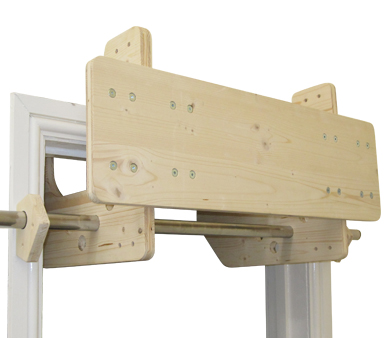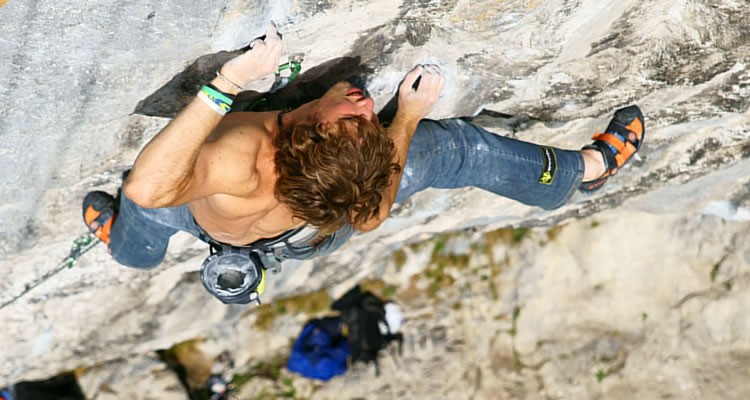Time 2 Train
- Font size: Larger Smaller
- Hits: 37140
- 0 Comments
- Subscribe to this entry
"Train around your work schedule or work around your training schedule - That is the question..."
People often ask me how to go about mixing your working life with the training plan. Is it possible to work full-time and continue to see improvements in your climbing through training? The answer is Yes, but it's certainly no easy task. It requires:
- Organisation
- Dedication
- Motivation
- Recucitation (On occasion)
I have coached and provided training programs for a lot of climbers who have busy work schedules. To say that you have to sacrifice one for the other is crazy, but to make it work you may have to make a few scarifices on both ends.
A Rig Life
A good example of someone who has made sacrifices is Phil Jack (a good friend and follower of one of my programs). He works off-shore 2 weeks on and then has 2 weeks off.

This (as you can imagine) eats massively into the amount of time he has available to climb and train. The other issue being that when he gets back after 2 weeks of hard work on the rigs, he is pretty tired and requires a good few days to recover first.
Despite this, he has equipped himself with a decent fingerboard and a plan to follow that he completes everyday he's on the rigs because he knows that his time spent training will go to good use when he hits the rock.
Phil's sacrifices for training are largely time based - he gets up extra early in the morning to make sure he can get a fingerboard session in before work as well as putting any extra time available during the day to good use.
I think that out of all the work shcedules I know off, none can be as hard on training as what Phil does seeing as how physcially and mentally draining his work on the rigs actually is. It's not just a 9-5 job either, as long as he is on the rig he isn't going to be getting the best recovery he could get because he simply isn't at home, in his own bed, eating his own food. Not to mention the hours he works are long and hard!
Thankfully most of us aren't in the same situtation as Phil. 9-5 jobs are a lot easier to work with, but many people still struggle balancing their climbing with their work/social lives. I am lucky as the two coincide together, but even I find it increasingly hard to find the time I need to train.
9-5
For those working something along the lines of a 9-5, you need to figure out your weekly work pattern (if you can get it in advance) and plan out what days of the week you can climb/train.
Your training schedule has to fit in around your work and social life initially, then any sacrifices you are willing to make can come afterwards one bit at a time. It's not worth it to make something that is so radically packed with hard training and volume that you can't possibly fit it into your lifestyle - you just won't do it then...
 That's a lot of training!
That's a lot of training!
Realistically, this is the length of time you are looking at for a good session in each training area:
- Fingerboard (30mins if added to a boulder session - 1 hour if on its own)
- Bouldering (1.5 Hours)
- Anaerobic Endurance Sessions on Circuits (1.5 hours)
- Anaerobic Endurance Sessions on Routes (2.5 hours)
- Any Aerobic Endurance Sessions (1.5 - 2.5 hours if on boulder or routes respectively)
A fingerboard session can be done before work, during a lunch break (as long as you get enough time and have access to a fingerboard) and easily in the evening straight after work or at anytime that suits.

Bouldering is quick and easy and can be done after work with relatively little hassle.
Anaerobic Endurance Sessions on a circuit board (bouldering wall) can easily be done after work in relatively quick time, however a route session will take at least an hour longer to get the same quantity done providing you have to belay your partner too.
Aerobic Endurance Sessions on a board are quick and painless but a route version of this can take anywhere from 2.5 to 4 hours depending on the type of session. Lapping routes just take a lot of time, especially when you have to belay your partner on another set after your own!

Squeeze in the Training
If it's impossible to get in that extra session at the wall, then it might be a good idea to invest in a handy home training setup? With something to do at home you will save a lot of time. A fingerboard or set of rock rings could be a good option? I use the Beastmaker Fingerboard and Crusher Rock Rings (for when I'm travelling and warming up at the crag). Because they are both made out of wood it is a lot friendlier on your skin.
There is also the issue for those who can't drill into the wall to set their fingerboard up. In this case it would be an idea to look into something like this for your fingerboard!

With this fingerboard mount you don't actually have to drill anything to the wall and it can easily be taken down after training in a few seconds. There is also the ability to hang a pulley system of the bar in the middle as well!
Many climbers I coach (mostly youth climbers) now have their own woodies in their house to train on. For a lot of the kids, they're busy school lives and other commitments means they can't train at the wall four days a week, so their parents have built them their own walls! Edinburgh now has a fleet of Malcolm Smith wannabies :P There is a replica of "Splinter" in every comp climbers household from here to Inverness!
Motivation
You can't train like this without the proper motivation. Climbers that benefit from the household training scheme have to be motivated enough to put in the hours on a weekly basis and see it through to the end. Thats why you have to have goals (Check out my UKC article)!
Recucitation :P
Training is hard work. Work is hard work. Together it's a lot of hard work. At the beginning you might find it impossible to do both together, but if you start of adding a little bit at a time, slowly you will become more used to the training and you should find it easier.
 Scott Keir doing a session on his fingerboard (behind is his home woody)
Scott Keir doing a session on his fingerboard (behind is his home woody)
When I started training before work I found it impossible! After a month of doing it I was in a routine that worked well for me and I saw noticeable gains in my performance. I then went on a climbing trip, came back and was back to square one, training in the morning felt really really hard! But guess what, after only a week of getting back into it I was into my old routine and feeling the gains after every session :D
My Advice
If you want to climb harder you have to put the hours in. A couple of extra hours a week (if you aren't already a professional climber) is usually all it takes to see some big gains. Experiment with some morning/lunchtime sessions or look into a home training setup and you might be pleasantly surprised with how you can squeeze in an extra bit of training to your weekly routine.
A little extra is better than none in most cases...









